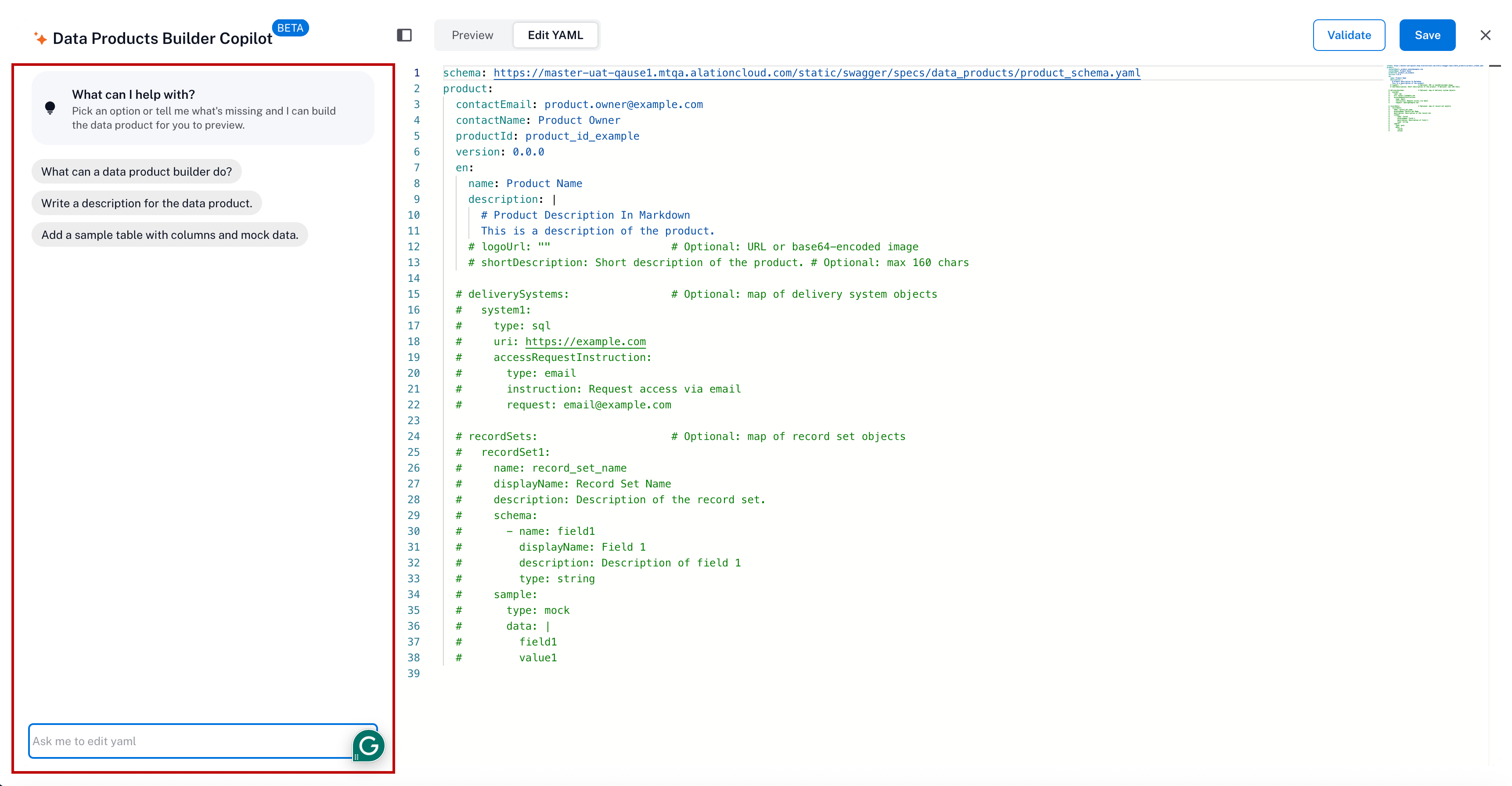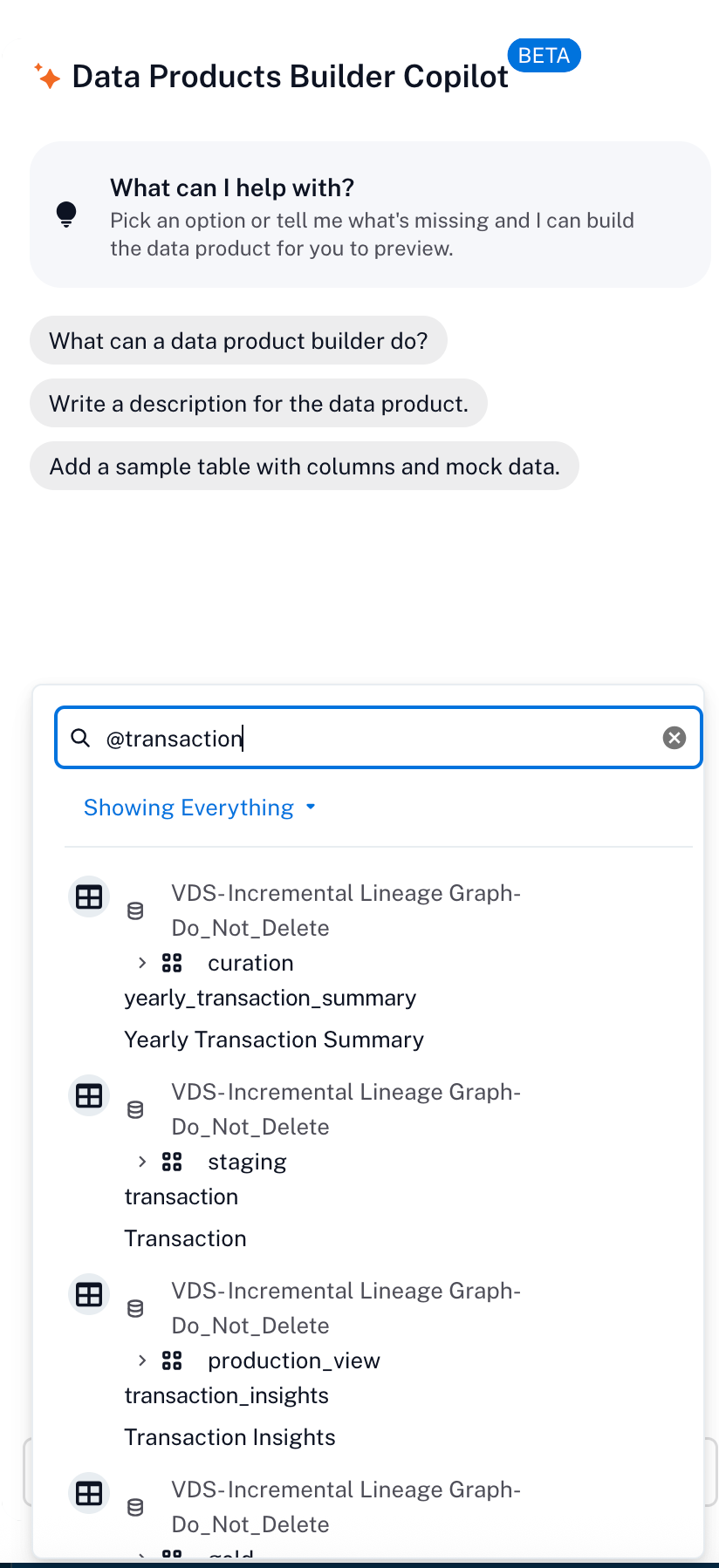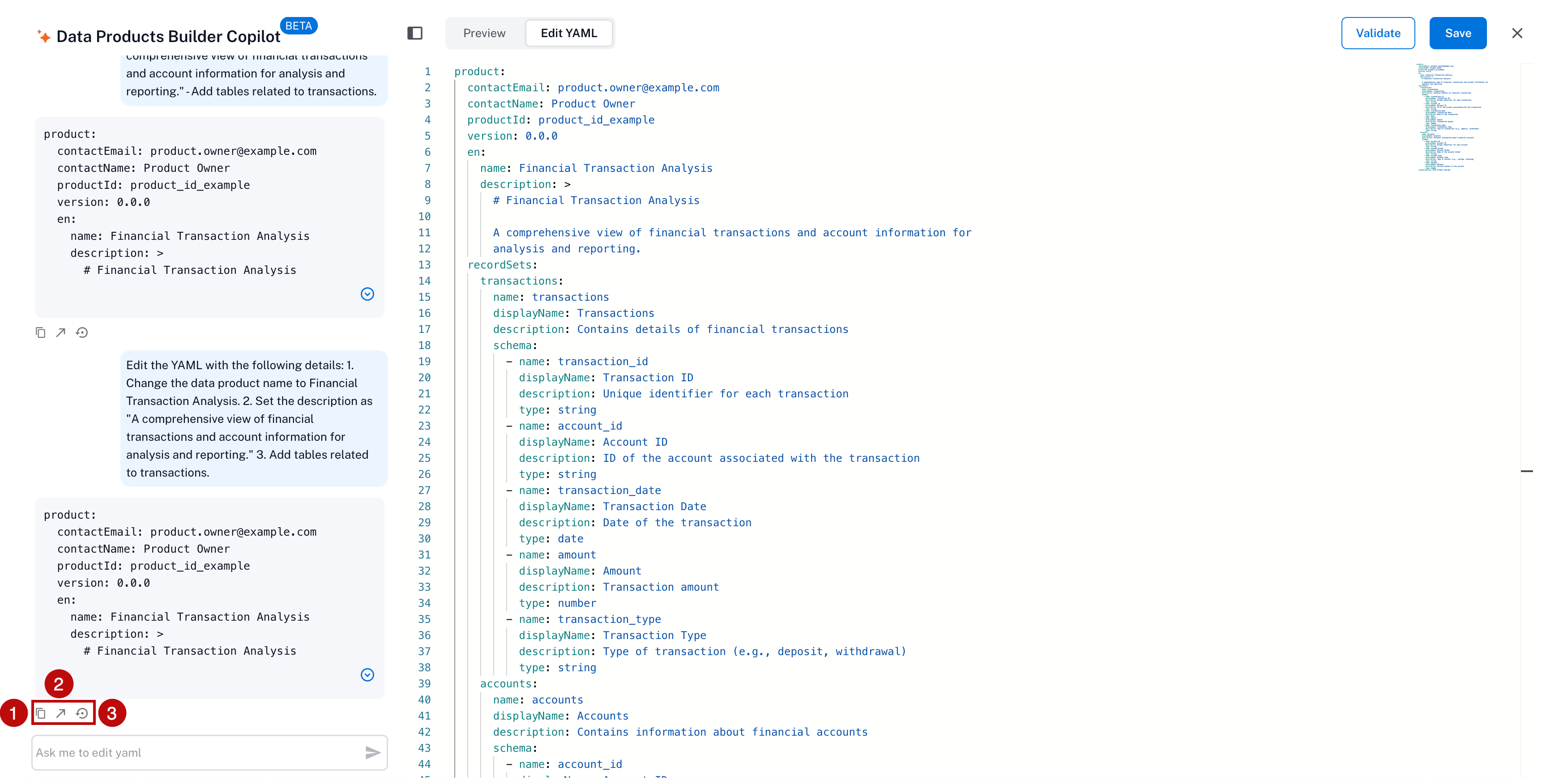Data Products Builder Copilot¶
Alation Cloud Service Applies to Alation Cloud Service instances of Alation
The Data Products Builder Copilot provides a guided and flexible way to create data products for your Data Products Marketplace. The Builder Copilot helps you create data products that comply with Alation’s data product schema requirements. The Builder Copilot works with the data product’s YAML definition, populating it on your behalf. You enter actions and describe the updates you want to the data product’s definition in natural language, and the Builder Copilot generates the corresponding YAML sections. You can then review the generated content and apply it to the editor. You can preview the data product configuration as you build it out.
The Builder Copilot feature is available in the data product editor window, and users who create and edit data products will automatically have access to it.
Data Product Definition Structure¶
A data product follows a prescribed format. It consists of components, each represented as properties in the YAML definition. Some properties are required, while others are optional.
Required Properties¶
Every data product specification must include the following:
Contact email (
contactEmail): Contact email of the data product ownerContact name (
contactName): Name of the data product ownerProduct ID (
productID): Unique product identifierVersion (
version): Version of the data productName (
name): Name of the data productDescription (
description): Description of the data product
Optional Properties¶
You can also add optional components, such as:
Delivery systems (
deliverySystems): Configuration that enables data consumers to request access to the data in the productRecord sets (
recordSets): A list of data assets that make up the product, with descriptions and optional mock data
You can find more details about all properties in Create Data Products Using YAML.
The Builder Copilot structures all YAML properties in the required format based on your natural language prompts. You guide the Builder Copilot by specifying:
Which component of the specification you want to add
What information to include in the relevant properties
Get Started with Builder Copilot¶
The left pane on the data product editor is your Builder Copilot. You can chat with it in natural language, and it writes or edits the YAML specification. If you’re satisfied with the response, you can Apply the Builder Copilot Output to the editor on the right. Use the Builder Copilot to fill in product metadata, delivery systems, record sets (tables) with fields, and example data. You can use the Preview feature (on the top left of the editor) to see a rendered view, and you still have full control to edit, validate, and save the YAML specification from the editor.
The screenshot below shows the Builder Copilot chat interface on the left of the data product editor window. By default, the Preview pane appears on the right side; click the Edit YAML for YAML editor view .

Ready-To-Use Prompts¶
Data products Builder Copilot offers three ready-to-use prompts. Click a prompt to send it to the chat field at the bottom, then press Enter to send. The following sections explain the responses to the ready-to-use prompts.
What can a data product builder do?¶
Use this prompt to kickstart the Builder Copilot from scratch. Once you click this prompt and press Enter, Builder Copilot sends you back the following message, which describes the purpose of the Builder Copilot and the properties that you can ask Builder Copilot to edit in the YAML format.
Description:
Data Product Builder is
your copilot. It helps you
define your data product
from scratch or refine an
existing product. You can instantly
preview and get feedback.
Ask your builder to:
- Add table <table_name>
- Add table 'customers' with start_date, country, and acq_date
- Add revenue column
- Add acquired_date column
- Suggest sample data
- Change description
- Update owner info
- Set logo url
- Search and add existing tables from the Alation Catalog using the @ symbol
- Update/Delete existing tables and columns from the data product (without using the @ symbol)
Write a description for the data product¶
Use this prompt when you want Builder Copilot to draft or improve the description of the data product. Once you click this prompt and press enter, Builder Copilot sends you back the following message with a Builder Copilot-generated description. You can still edit the description in the editor pane or prompt Builder Copilot if you need any changes to the suggested description.
Along with the description, Builder Copilot also shares the following properties with the placeholders. Users can update the placeholders with the original value.
contactEmail
contactName - You can select the name of the product owner from the user list in your Alation instance. In the chat input field, type @ and select the user you want to add.
name
productId
version
product:
contactEmail: product.owner@example.com
contactName: Product Owner
productId: product_id_example
version: 0.0.0
en:
name: Product Name
shortDescription: Comprehensive data product overview
description: |
# Comprehensive Data Product Overview
This data product provides a centralized, reliable source of structured
data designed to meet diverse analytical and operational needs across
your organization. Built with scalability and data quality in mind, this
product offers seamless access to critical business information through
multiple delivery channels.
<...>
Add a sample table with columns and mock data¶
Each data product lists the data available for consumers to use in the relevant use case. The data component is defined in the specification under the recordSets property.
Use this prompt to inspect a sample table with columns loaded with mock data. Once you click this prompt and press Enter, Builder Copilot responds with the following message, showing the structure of the recordSets component, which allows listing your data assets.
product:
contactEmail: product.owner@example.com
contactName: Product Owner
en:
description: |
# Product Description In Markdown
This is a description of the product.
name: Product Name
productId: product_id_example
recordSets:
sampleTable:
description: |
A sample table containing customer information with basic demographic
and contact details.
displayName: Sample Table
name: sample_table
sample:
data: |-
customer_id,first_name,last_name,email,registration_date,is_active
1,John,Doe,john.doe@email.com,2023-01-15,true
2,Jane,Smith,jane.smith@email.com,2023-02-20,true
3,Bob,Johnson,bob.johnson@email.com,2023-03-10,false
4,Alice,Brown,alice.brown@email.com,2023-04-05,true
5,Charlie,Wilson,charlie.wilson@email.com,2023-05-12,true
type: mock
schema:
- description: Unique identifier for each customer
displayName: Customer ID
name: customer_id
type: integer
- description: Customer's first name
displayName: First Name
name: first_name
type: string
- description: Customer's last name
displayName: Last Name
name: last_name
type: string
- description: Customer's email address
displayName: Email Address
name: email
type: string
- description: Date when customer registered
displayName: Registration Date
name: registration_date
type: date
- description: Whether the customer account is active
displayName: Active Status
name: is_active
type: boolean
version: 0.0.0
You can use Free-Form Prompting with Copilot to refine the results until they match your requirements.
List Data in Your Data Product¶
For tables or views catalogued in Alation, you can use at-mention search to find and reference them:
In the chat input field, type @.
Search for and select the table or views you want to add.
Use targeted prompts to add mock tables and columns:
Add table <table_name>
Add view <view_name>
Examples:
Add table
customerswithstart_date,country, andacq_dateAdd the
revenuecolumnAdd the
acquired_datecolumn
The above examples lets you add mock tables and columns. You can also use the at-mention search to add existing tables and columns from the Alation catalog.

When you send a prompt, Builder Copilot responds with generated YAML for the recordSets property.
Review the output and further refine it by:
Adding or removing tables and columns
Asking Builder Copilot to generate mock data
To validate the YAML, click the Validate button at the top right of the editor. See Validate Data Product YAML for more information.
Free-Form Prompting with Copilot¶
The three ready-to-use prompts are just shortcuts. You can type any instruction in plain English, and Builder Copilot will add, edit, or refactor the YAML while preserving what’s already there.
The following are a few prompt examples that you can refer to when creating your data product:
Create a data product product named Transaction Details, product ID
cust_trans_information, ownerAdmin.Account@Alation.com, version1.0.0.Add tables that contain transaction information, including table descriptions and display name.
Note
If you know which table you want to be added in the data product, you can type
@followed by the exact name and select it.Suggest realistic sample data for the tables.
Improve short and long descriptions for business and technical audiences.
Prompt Tips¶
Use one intent per message to keep results precise.
Be explicit: Name the record sets and list fields with types (string, number, integer, Boolean, date, timestamp).
Use IDs vs. display names: Name for stable IDs (
cnf_ordrs), displayName for human-readable labels (Confirmed Orders).Iterate: Use Builder Copilot to make changes, then refine to get to the result you want.
Apply the Builder Copilot Output¶
Every Builder Copilot reply includes a small toolbar to help you move YAML between the chat and the editor.

Apply¶
The Apply button (region 1 on the screenshot above) inserts the YAML from the response directly into the editor. This replaces the corresponding section of the specification. If the response includes a whole YAML definition, the whole definition will be replaced.
Copy¶
The Copy button (region 2 on the screenshot above) copies the entire YAML from that Builder Copilot message to the clipboard, so you can paste it into the editor. Manually copy the YAML if you only want a portion of the YAML to editor.
Revert¶
The Revert button (region 3 on the screenshot above) restores the editor to its previous state before the last Apply from the toolbar. Use this if an applied change wasn’t what you expected.
Difference¶
The Difference button (region 4 on the screenshot above) shows a side-by-side diff view of the current editor content and the proposed changes from the Builder Copilot response. This helps you review what changes will be made before applying them.
Security¶
Content Privacy¶
Amazon Bedrock ensures the following protections for your content:
Content is not utilized to improve underlying AI models.
All data remains encrypted at rest and in transit.
Safety¶
Amazon Bedrock implements automated abuse detection mechanisms to identify and mitigate potential violations of AWS’s Acceptable Use Policy (AUP), Responsible AI Policy, or a third-party model provider’s AUP.
Abuse detection mechanisms are fully automated, so user inputs and model outputs are not reviewed or accessed by humans. See Amazon Bedrock abuse detection in the AWS documentation for more information.
Geographical Availability¶
Amazon Bedrock-backed AI features are currently not universally available across all Alation-supported regions. To extend AI functionality, Alation securely routes traffic cross-region through AWS private infrastructure using TLS 1.2 encryption. See the following table for region-specific routing details:
Origin Region |
Target Region |
|---|---|
us-east-1 (US East, N. Virginia) |
us-east-1 (US East, N. Virginia) |
us-west-2 (US West, Oregon) |
us-west-2 (US West, Oregon) |
ap-northeast-1 (Asia Pacific, Tokyo) |
ap-northeast-1 (Asia Pacific, Tokyo) |
ap-southeast-1 (Asia Pacific, Singapore) |
ap-southeast-1 (Asia Pacific, Singapore) |
ap-southeast-2 (Asia Pacific, Sydney)* |
ap-northeast-1 (Asia Pacific, Tokyo) ap-northeast-2 (Asia Pacific, Seoul) ap-south-1 (Asia Pacific, Mumbai) ap-southeast-1 (Asia Pacific, Singapore) ap-southeast-2 (Asia Pacific, Sydney) |
ap-south-1 (Asia Pacific, Mumbai)* |
ap-northeast-1 (Asia Pacific, Tokyo) ap-northeast-2 (Asia Pacific, Seoul) ap-south-1 (Asia Pacific, Mumbai) ap-southeast-1 (Asia Pacific, Singapore) ap-southeast-2 (Asia Pacific, Sydney) |
eu-central-1 (Europe, Frankfurt) |
eu-central-1 (Europe, Frankfurt) |
eu-west-1 (Europe, Ireland)* |
eu-central-1 (Europe, Frankfurt) eu-west-1 (Europe, Ireland) eu-west-3 (London) |
* Cross-region calls are allowed from the origin region to any of the mentioned target regions. The underlying model is hosted in specific AWS regions. When a customer’s deployment region doesn’t support the model, the request is routed securely to the nearest supported region using AWS PrivateLink. See Supported foundation models in Amazon Bedrock for more information.
Note
Canada region is not supported.
Frequently Asked Questions¶
The Data Products Builder Copilot is an AI-powered assistant integrated into the data product editor. It helps users create, edit, and refine data product specifications in YAML format using natural language prompts.
Data product builders such as data engineers, analysts, and stewards who design and accelerate creation of governed data products.
Domain experts who provide business context and requirements, leaving technical definition to builders.
AI developers who require governed, AI-ready products as inputs into their workflows.
Users can fully review, edit, or override any YAML suggestions.
